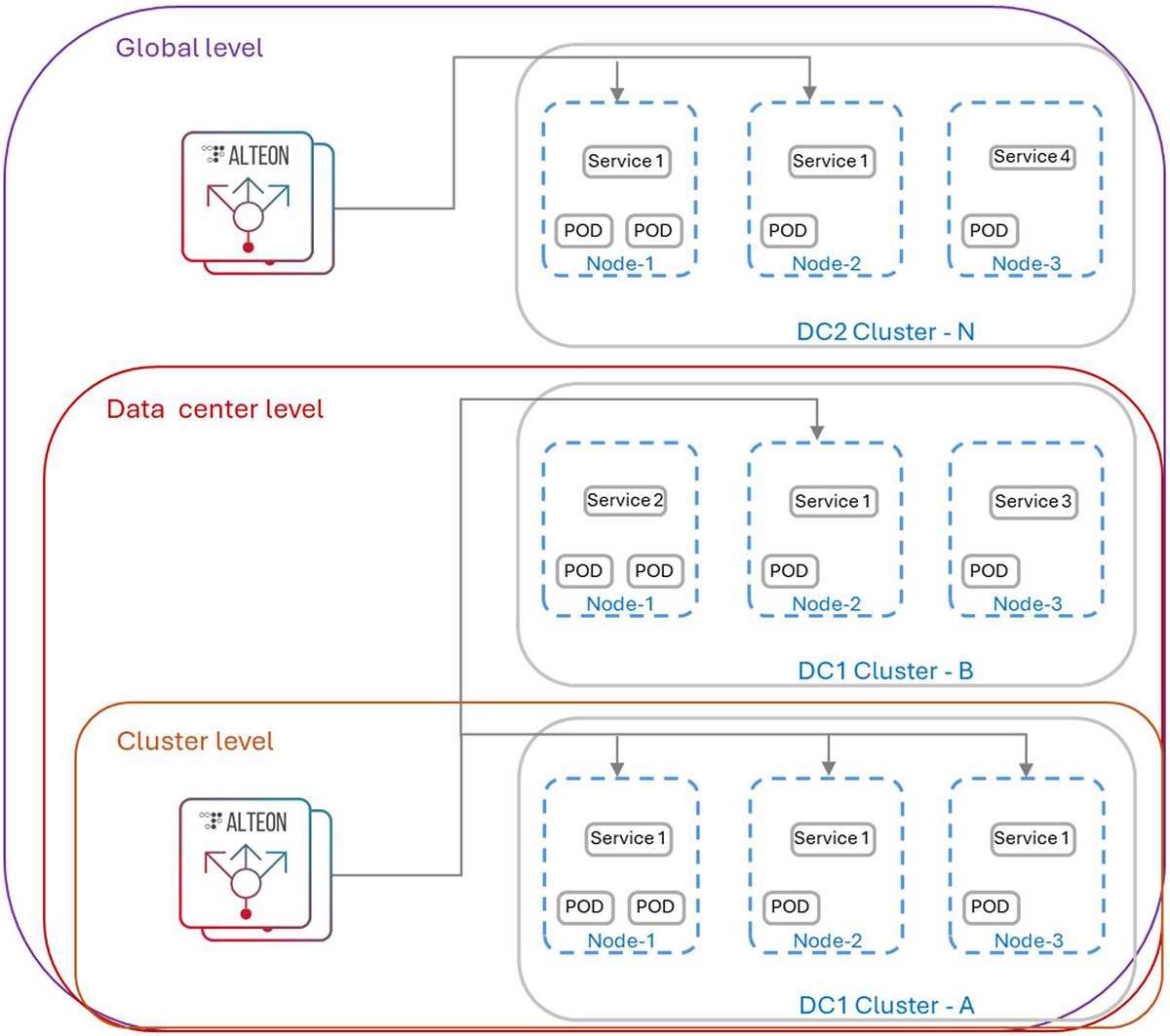Navigating Kubernetes Scalability Challenges with Alteon
Challenges in Kubernetes/OpenShift environments
While Kubernetes is a powerful orchestration tool that greatly simplifies the deployment, scaling, and operations of application containers, it does have practical limitations that can impact its scalability, availability, and reliability. One of the main limitations is related to its underlying infrastructure; the scalability of a Kubernetes cluster depends on the underlying physical resources (CPU, memory, storage, network) available in the infrastructure – each node has a finite capacity, and while the cluster can handle more workloads as you add more nodes, it is not unlimited. The larger and more complex your cluster, the more effort is required to maintain it and if the cluster’s hardware or the network experiences issues, Kubernetes services may become unavailable.
Furthermore, the control plane (which includes the API server, etc., controller manager, and scheduler has its own scalability limits.
Resource management is another area where Kubernetes faces scalability issues. Efficiently scheduling and distributing resources like CPU and memory across a vast number of pods and nodes requires advanced planning and sometimes custom solutions beyond what Kubernetes offers out of the box.
Lastly, the human element cannot be overlooked. The complexity of managing a large-scale Kubernetes cluster requires skilled personnel with deep knowledge of Kubernetes architecture and best practices. This expertise is not always readily available, which can limit an organization’s ability to scale its Kubernetes infrastructure effectively.
In conclusion, while Kubernetes is a powerful tool for container orchestration, it is essential to understand its practical limitations regarding scalability. Careful planning, monitoring, and sometimes custom solutions are required to ensure that a Kubernetes cluster can scale effectively without compromising performance or reliability.
Scalability and Reliability with Alteon
Alteon Application Delivery Controller (ADC) is pivotal in enhancing the availability and scalability of Kubernetes (K8) environments. When installed outside a K8 cluster, Alteon can manage traffic distribution to ensure consistent application performance across single or multiple clusters, availability zones, and even across different regions. This strategic placement allows for a seamless integration with existing network infrastructures and provides a centralized point of control for traffic management, thereby simplifying operations and improving resource utilization.
Ingress Agnostic
In the dynamic landscape of network architecture, there is a continuous emergence of innovative solutions for layer 7 traffic redirection within Kubernetes (K8) clusters. As companies transition from monolithic applications to more modular and scalable K8 environments, the significance of external Application Delivery Controllers (ADCs) becomes increasingly pronounced. Alteon plays a pivotal role in load balancing traffic to ingress controllers or gateway APIs, ensuring seamless connectivity and service delivery. Its agnostic nature to ingress/gateway API providers offers a versatile and essential tool for organizations navigating the complexities of modern application deployment and management.
Scalability from Cluster Level to Global Reach
Alteon enables Kubernetes services to scale from a singular cluster to the global level, across multiple data centers.
In single-cluster deployments, Alteon can optimize traffic flow within the cluster, ensuring that applications are highly available and performant.
For environments spanning multiple clusters and availability zones, Alteon becomes even more crucial. It enables efficient traffic distribution across clusters, preventing any single point of failure and ensuring high availability. Moreover, in multi-region deployments, Alteon facilitates global server load balancing (GSLB), which directs users to the closest or best-performing data center, thus enhancing the user experience by reducing latency.

Furthermore, Alteon provides advanced features such as SSL offloading, which relieves the Kubernetes cluster from the processing overhead of encrypting and decrypting traffic. This not only boosts application performance but also strengthens security by centralizing SSL management.
Alteon Integration with K8/OpenShift Orchestration
The Alteon Kubernetes Connector (AKC) stands as a pivotal solution for integrating Alteon with Kubernetes/OpenShift orchestration frameworks. This integration facilitates the automatic load balancing of traffic across Kubernetes workloads, ensuring efficient distribution and management of network resources.
AKC operates by discovering services within the Kubernetes cluster and converting them into actionable Alteon configurations. It continuously monitors the dynamic environment of the cluster, tracking the addition or removal of nodes/pods, and relays this information to Alteon. This process ensures that the Alteon configuration remains updated and in harmony with the current state of the Kubernetes clusters.
Furthermore, AKC’s capability to identify and consolidate services running across multiple clusters empowers Alteon to deliver robust load balancing solutions. This not only enhances high availability across clusters but also optimizes the overall performance of the network infrastructure.
Leveraging Alteon to Meet Security Challenges
The transition from monolithic applications to microservices-based architectures is a significant shift in the software development landscape. This evolution offers numerous advantages, such as improved scalability, flexibility, and the ability to deploy services independently. However, it also introduces a set of challenges, particularly in the realm of security. One of the primary challenges in this transition is ensuring consistent security policies across all services.
Alteon enables the use of Radware’s top-tier data and application protection, KWAAP (Kubernetes Web Application and API Protection), which is specifically designed to seamlessly integrate with Kubernetes environments. This allows for uniform security policies across both traditional and modern applications. For the security of monolithic applications, Alteon interacts with KWAAP in an out-of-path manner. KWAAP then examines the data of the monolithic application and determines whether the traffic is legitimate or malicious.
In addition, for clients who prefer a managed application security solution, Alteon, equipped with the Radware SecurePath plug-in, can guarantee protection for both traditional and modern applications using Radware’s Cloud WAAP (Web Application and API Protection). This is also achieved through similar out-of-path architecture.
Conclusion
Leveraging Alteon outside of Kubernetes clusters is a strategic approach to achieving high availability and scalability in modern application deployments. It ensures that applications remain resilient and performant, regardless of the complexity of the underlying infrastructure.
To learn more about how Radware can help your organization, check out this link: Radware Alteon solution information.



